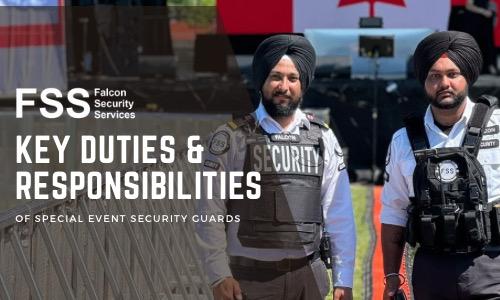
Special events, whether concerts, corporate gatherings, sports events, or public festivals, require a structured approach to security. Special event security guards play a crucial role in ensuring the safety of attendees, staff, and property. Their responsibilities extend beyond mere crowd control, covering risk assessment, emergency response, and law enforcement collaboration. This article outlines the key duties and responsibilities of special event security guards, helping event organizers understand the importance of professional security personnel.
Special event security guards are trained professionals responsible for ensuring the safety of attendees, staff, and property at various events. Their primary role is to prevent security breaches, manage crowd control, and respond to incidents effectively. Unlike standard security guards, event security personnel must handle dynamic and high-pressure environments where large crowds and unexpected situations can arise.
These guards work for security firms or directly with event organizers, law enforcement agencies, and private companies. Their expertise extends to threat assessment, emergency response, and risk mitigation strategies tailored to specific event types.
Before any event begins, security guards participate in a thorough risk assessment. This includes:
Emergency response planning: Establishing protocols for fire outbreaks, medical emergencies, or security breaches.
One of the primary responsibilities of special event security guards is controlling access to the venue. Their tasks in this domain include:
Screening attendees: Checking tickets, IDs, and credentials for authorized entry.
Preventing unauthorized entry: Stopping gatecrashers and managing guest lists efficiently.
Large events attract thousands of attendees, making crowd control a critical duty. Security guards must:
Monitor crowd behavior: Identifying signs of aggression, fights, or potential stampedes.
Break up disturbances: Intervening in conflicts before they escalate into serious incidents.
In the event of an emergency, security personnel must react quickly and efficiently. Their responsibilities include:
Evacuating attendees: Guiding people toward emergency exits in case of fire, bomb threats, or natural disasters.
De-escalating conflicts: Using communication and conflict resolution skills to defuse tense situations.
Security guards play a crucial role in continuously monitoring event activities to detect suspicious behavior. Their tasks include:
Operating CCTV cameras: Keeping an eye on different sections of the venue.
Reporting security breaches: Documenting and alerting supervisors about potential risks.
At any large event, there may be attendees who cause disruptions. Security guards must be prepared to:
Deal with intoxicated individuals: Removing those who pose a threat to themselves or others.
Assist law enforcement if needed: Handing over offenders to the police if necessary.
Security personnel are also responsible for safeguarding property and assets at the event. This includes:
Preventing theft and vandalism: Monitoring valuable equipment, merchandise, and personal belongings.
Escorting VIPs and performers: Providing security for high-profile guests as they move through the venue.
Effective communication is key in security operations. Special event security guards must:
Stay in contact via radios: Using walkie-talkies or other communication tools to report incidents.
Follow chain of command: Ensuring that security directives are followed as per event protocols.
Once the event is over, security responsibilities continue. These include:
Managing exit flows: Ensuring orderly dispersal of attendees to prevent post-event chaos.
Debriefing with the security team: Discussing lessons learned and areas for improvement in future events.
Special event security guards differ from general security personnel in the following ways:
Specialized Training: Unlike standard security guards, event security personnel undergo specific training in crowd control, emergency response, and access management. Their training often includes conflict resolution and de-escalation techniques tailored for large gatherings.
Conclusion
Special event security guards play an essential role in maintaining order and ensuring the safety of attendees, staff, and property. Their responsibilities extend from pre-event planning to post-event security measures. By effectively managing access control, crowd control, emergency response, and asset protection, these professionals help create a secure environment for successful events. Organizers must prioritize hiring trained security personnel , such as those specializing in executive protection in Canada, to ensure seamless event execution and the well-being of all participants.
FAQs:
What is the role of a special event security guard?
A special event security guard is responsible for ensuring the safety of attendees, staff, and property at events. Their duties include access control, crowd management, emergency response, and conflict resolution.
What types of events require special event security guards?
Special event security guards are needed for concerts, festivals, corporate events, sporting events, private parties, political rallies, trade shows, charity events, and large public gatherings.
How do special event security guards manage crowd control?
They manage crowd control by setting up barriers, directing foot traffic, monitoring crowd behavior, and preventing overcrowding to ensure a safe environment.
What are the key responsibilities of special event security guards?
Their key responsibilities include access control, surveillance, conflict resolution, emergency response, VIP protection, and ensuring compliance with security regulations.
How do event security guards handle emergencies?
They follow emergency protocols, assist with evacuations, provide first aid if necessary, and coordinate with law enforcement, medical teams, and fire departments to manage critical situations.
How do event security guards ensure venue security?
They monitor entry and exit points, check for prohibited items, patrol the venue, and use surveillance equipment to detect potential threats.
What makes special event security guards different from regular security personnel?
Special event security guards undergo specific training for crowd management, high-pressure environments, and event-specific threats, whereas regular security personnel typically focus on static security.
How do security guards handle disruptive or intoxicated guests?
They use de-escalation techniques to calm individuals, remove them if necessary, and, in extreme cases, coordinate with law enforcement for further action.
Are special event security guards trained in first aid?
Yes, many event security guards receive basic first aid and CPR training to handle medical emergencies until professional medical personnel arrive.
Why is hiring professional event security important?
Hiring professional security ensures a safe and controlled environment, prevents potential threats, reduces liability for organizers, and enhances the overall experience for attendees.